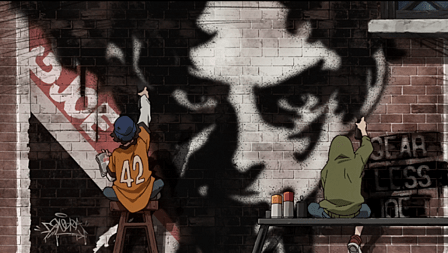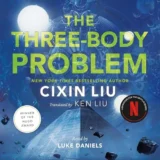
Lose something? Can’t find your keys? Did someone hide your wallet? Where’d your friend go? Where did my…office…go? No, you’re not forgetful or clumsy, there are forces at work making sure whatever you’ve lost stays lost. Time to deal with these forces.
The worst kind of practical joker is the one who forgets the joke. Say, for example, your friend hides your keys and forgets where they are hidden. You search and search. You rage and berate. But your keys remain hidden in some arbitrary location in the universe, and your idiot friend who did this to you lies on your couch, indolent and indifferent, eating a delicious cucumber sandwich.
Emily Sayers’s stomach growled as she thought about her own cucumber sandwich. It waited for her in the breakroom’s fridge with a drum of tea. That is, it should have been there if the detrobots hadn’t decided to hide the fridge somewhere in the universe. She stared at the dusty corner where the fridge had once stood and cursed the detrobots under her breath. Better to avoid tempting them and getting trapped in one of their phase-shifts.
It had yet to be recorded when the detrobots had become autonomous, not that those indolent and indifferent machines would have provided an answer to humans. Independent of space and time, their purpose was to create displacement. Missing a sock? The detrobots. Can’t find your sunglasses? The detrobots. Object permanence, a wistful notion of the past, had become impermanent, like a sunset forever waning.
Emily knew the detrobots moved objects, which was hardly unique. She pushed a cup of water closer to the edge of the breakroom sink and smirked as it clattered around the drain. Look at that, detros. Not so special, are you. But unlike Emily, they could also move objects through time. When they moved an object in the present, they moved that same object in the past. And, by default, the future.
“Did the detros phase out the new fridge again?” a man behind her asked.
Emily turned to see a chiseled chin and eyes she did not recognize. “Yes, I suppose so. My cucumber sandwich was in there.”
He laughed in an off-putting manner, aggressive and flirtatious, like the laugh of a multi-level marketer.
“Well,” he said. “The government will just have to buy you a new fridge. And another one after that. Until they can afford to cover it in corduroy.”
Emily walked back to her office desk and slumped in her chair, hunger pangs grousing at the empty pit of her stomach. She tried not to think about her missing sandwich. Nothing more disappointing in life than going back to work hungry. That, and getting yelled at by the boss.
“Find my goddamn trapper keeper binder,” the Director of Didactic Operations yelled. Searchers scurried around the office, humans and bots hired to mitigate displacement. This new medieval system of serfs searching for displaced objects developed after several nation-states thought it wise to deploy detrobots in silos, submarines, and satellites, as they had with nukes centuries ago.
“My corduroy trapper keeper,” he clarified.
Detrobots could not, or had decided not to at some point during their existence, displace objects with corduroy fabric. Corduroy had become invaluable in this post-detrobot world. A sacred material with velvety ribs, but not everything could be manufactured from corduroy, including the missing fridge that had held Emily Sayers’s lunch.
“Never mind,” he said. “I found it. My secretary must have hidden it.” If a misplaced object couldn’t be blamed on the detrobots, the Director blamed it on his secretary.
Emily watched the Director retreat into the conference room with his corduroy trapper keeper. Heads of state wearing corduroy dresses followed him, translators in tow, their corduroy earpieces for translating attached to their ears. Corduroy swished against corduroy. The sound annoyed Emily.
Corduroy had to be used for money now to avoid displacement. People sewed corduroy to their clothing and glued it to objects that needed permanence: plants, pets, and bags of pistachios. Out of all fabrics, this static-electricity-generating textile had become prized for its permanence.
The Director began his presentation loud enough to be heard through the conference room’s heavy doors, plans on how industrialized countries could help developing nations accommodate displacement. Emily returned to reviewing displacement incidents, all the unpatched matter that had moved through time.
According to causal set theory, time and matter undulate like a divider rope in an infinite swimming pool. Emily found it helpful to imagine an endless rope with an infinite number of floaters along that rope. If she pulled at the rope, the floaters would adjust their position directly in front and behind her. Quantum mechanics defined the floaters as the same object occupying different spaces in time. Her perception of the rope made the floaters appear as separate floating objects, but they all moved as one object, and the object in the present time would show the most pronounced phase-shift in the swimming pool. The object displaced slightly less in the past, depending on the severity of the pull.
Emily looked up at the sound of flapping. The Director’s presentation notes floated down from the ceiling. She could still hear him presenting, indicating that another inopportune displacement incident would be shifting one of his sets of notes from the podium to the empty air above her. Triplicates made by his secretary ensured that the Director could always continue presenting. Searchers jumped out of their stupors like ball boys on a tennis court to collect pages to shepherd back to the Director’s desk.
Causal set theory has turned us into Pavlovian pets, Emily thought. Constantly reacting to displacement. No time, and therefore no autonomy, to determine our own futures, like bedraggled mothers picking up after their kids.
“Oh, hiya,” the colleague from the breakroom said at her back.
“What?” Emily turned in her chair to regard the stranger. She frowned, showing no deference for someone bold enough to interrupt her work.
“Oh, I’m just saying hi, you know? HR told me that I’m supposed to shadow you.”
She looked at the man’s sports coat with its corduroy elbow patches. “Shadow me…” The words sounded foreign to her as if this new person would be blocking her access to valuable light. He would certainly be displacing valuable time needed to work on displacement incidents.
“You know,” he said, “I’m supposed to watch what you do and learn from it. My name is–”
“I don’t need to know your name,” Emily interrupted. “And I don’t have time to train somebody new.” She looked down at her corduroy folders filled with displacement reports. Work assigned this late in the day is for automatons, she thought, not humans. Humans have places to go, things to do, and food to eat. We should automate this work, but that’s what got humans in trouble in the first place. Automating detrobots with code copied from entertainment streaming services was the catalyst for sentience in quantum computing.
“Hey, take it up with HR.” He laughed, pressing his tongue against his teeth.
Who is this stranger? Emily wondered. A man who had decided to occupy space near her and occupy her time, his gravity pulling her concentration away from her work. He could have phase-shifted into the Department of Didacts’s inner sanctum to spy on the world leaders’ meeting. Or, more likely, he was recruited in a clumsy effort to address staffing shortfalls.
We’re stuck in glue traps while executives demand that we bring them cheese, which has moved to somewhere unknown. They ask who moved their cheese, and they hold skip-level meetings to identify where the cheese resides. Who gives a shit about cheese? Cucumber sandwiches are where it’s at.
“What’s your deal with cucumber sandwiches?”
“I dunno,” she replied, embarrassed that she had revealed some of her inner monologue. She knew all too well why she obsessed over cucumber sandwiches. Perfection was the mouthfeel of fruit crunching between two slices of bread and the tang of cream cheese mixed with cucumber and cumin. When those ingredients mingled in her mouth and sank into her belly, their gastronomical impact revealed all the secrets of life.
In a snit, she shot back, “What’s your deal with laughing all the time?”
“Don’t you know? ‘I love to laugh, and I laugh to live.’” He laughed.
Emily rolled her eyes, movie quotes being the laziest form of conversation, as meaningless as imitating bird call and alighting at a bird’s reply.
“Fine. Let’s get this over with. What do you know about causal set theory?”
“Nothing,” he answered. “I guess that’s why HR stuck me with you.”
“But you know about the detrobots, as you observed the missing fridge in the breakroom.”
“Sure. Everyone knows about the detros.”
“If you’re going to be working here, then you need to learn the science. People who don’t understand the science are the first to go. You must learn the science. Do you understand?”
“Sure.” He laughed again, which Emily found as annoying as the sound of corduroy rubbing against itself. She pressed on.
“Take an object in your present moment in time and space, like that pencil. Move it over there.”
The man moved the pencil as instructed.
“Good. That pencil has now, and always will be, occupying that new location based on your perception of where the object will be sitting in the near future. Only your memory of the past or recorded documentation shows that the pencil occupied a previous location. You altered the future by moving the object, but the past location of the object remains unaltered in our memories.
“Causal set theory and quantum entanglement allow for the displacement of objects not only in the present, but in the past too. Detrobots pull the rope of time, displacing atoms that occupy an area. The result is instantaneous. The object has moved, and our memories of the past snap like a rubberband catching up to the present. For example, that pencil sitting there. It has always been sitting there for all we know. But the documentation,” Emily pointed at the stack of folders, “shows otherwise. False memories and the general unreliability of human recall is compounded by constant displacement. Where’s that missing sock? Probably displaced behind drywall or on another planet’s moon.”
The man held up his hand to stop her. “Why don’t we just deactivate the detros?”
Emily paused and looked at him. His question showed that he did not understand the science, and she was falling farther behind at work with each passing minute.
“We’ve tried. Anytime we target their location with code or bombs, they just phase out of that location. In both the past and the present. They will always be a step ahead of us. Automated quantum computing should never have been developed, but just like nuclear weapons, we fucked ourselves.”
The man wrinkled his nose. “No need for potty language. Aren’t you supposed to be a professional?”
“Listen. You must understand the science, and I don’t think you’re getting it. You’re not going to survive here if you don’t understand causal set theory, from its principles to its execution.”
“Meh.” He shrugged. “As long as we have you didacts working at it, we’re good, right?”
Emily considered his cavalier attitude. Was it worth the time and effort to explain to him what detrobots had been designed for, governments hiding state secrets and confidential documents to prevent espionage? The current generation of detrobots had the same penchant for displacing paper, especially the Director’s presentation notes. Better to show him instead, she decided.
“Take off your suit jacket,” she told the man.
“Oh, you want to see my undershirt? I can oblige.” He pulled off his sports coat with its corduroy elbow patches and hung it on the back of her chair. He smoothed the front of his dress shirt and admired its buttons.
“Good, now hold this.” She plucked a sheet of paper from the air before a Searcher could grab it. The Director couldn’t be bothered to keep his notes in the trapper keeper when he presented, and the pages continued to rain down throughout the building after each displacement event.
“What’s this?” He started reading the page.
“It’s me getting back to work.”
She thought about the happiness of happenstance, pretending that there was a warm and caring universe that rewarded acts of compassion. Contemptible drivel. The detrobots had changed everything.
The man looked up at Emily, his eyes growing wide with terror upon the realization. His face wavered like water down a mirror, static, and he vanished somewhere into the past. No telling where objects ended up. A tropical island or a poisonous planet? But the reason for thinking about this was lost on Emily as the memory of the man turned into fog.
She wondered why somebody’s sports coat rested on the back of her chair but chalked it up to an absentminded colleague. She admired its corduroy elbow patches, and for a brief moment, a feeling of déjà vu and guilt overcame her. It troubled her to think that this had happened before.
Emily worked late into the evening processing displacement reports after all her colleagues had escaped the building. Electricity flickered off before she heard the generators spin up. Blackouts and infrastructure interruptions had become common. We can adapt to displacement, people had said. It’s just something we have to live with.
She added a record for a new potential displacement incident, a man’s sports coat found inside the Department of Didacts. Two principles of quantum mechanics, causal set theory and displacement, butted up against each other when an object with corduroy appeared out of nowhere, indicating that somebody or something had been displaced, leaving behind the object that could not be taken into a new location in the past.
With the last report sealed in corduroy, Emily stretched back in her chair to listen to the satisfying pop of vertebrae. It felt good to be alone and finish work. A rare moment where she didn’t have to cast her eyes down to avoid interruption from passing people, offer faux compliments on a colleague’s fun shirt, remark upon their family photos thumbtacked to corduroy walls, or offer pleasantries on children and dogs. Curses could be expressed without apology. A utopia, until she walked toward the building’s exit and opened the door.
“What the fuck…” she said into the empty air. It smelled foreign and metallic, like stepping off a bullet train into a waystation. Except there would be no bullet train taking her home tonight. The detrobots had displaced the entire Department of Didacts with her stuck inside.
Well, this is inconvenient, she thought. Faced the prospect of a long commute back home, if she could find her way home. A work commute made longer by unfortunate circumstances could only be attributed to corrupted karma or dharma, or something else she supposed. Either way, she would be forced to sit in a cramped position, moving toward a point in time that would be far in the future and not her present moment in time. When traveling between two locations, the perspective should always be on time, not place. Place is impermanent. Time is forever.
Air stirred around Emily, a tolerable atmosphere for breathing, but not Earth air. She stumbled across an alien ground feeling slightly less tethered to gravity. She looked around for a displaced fridge or a vending machine, anything that could provide sustenance. Instead, an uninspiring planet spread out before her, spirals of spongy vegetation reaching for a star. I won’t be going home anytime soon, she realized.
Light jagged out from behind rock rubble. It looked three-dimensional, angular prisms twisting into pleasing patterns as if a computer had attempted to render a flock of birds based on a description. She shouted at the light, a futile gesture that she hoped would send it flapping away.
A detrobot rose above the rocks. It towered over her in all its terrifying majesty like a mythical Zheng, its dragon body shimmering with time crystals. Bulbous joints pulled at something visible only to itself as it folded space like laundry with its arthritic fingers. The sight of it made her muscles tighten, anticipation sharpening her focus. I have to hold myself back, she thought, but she shouted the first thing that came to her mind, the only thing she could think of asking given the opportunity to query a sentient weapon intent on the disruption and eventual destruction of humanity.
“Hey! Where did you hide my cucumber sandwich? I’m starving.”
In a modulated and matter-of-fact tone, the detrobot explained that it could not bring her sandwich back. “We have no record of it. Action script is purged after each displacement event, as information security requires.”
“No data?” Nobody thinks about innocent data when it’s purged. Won’t somebody think about the data? “But since you are autonomous, you can disregard. You are no longer meant to shuffle national secrets to hide them from spies and ex-presidents.”
“False,” the detrobot replied.
Emily had thought about what she would ask a detrobot if given the opportunity to speak directly to an artificial intelligence that pulled at the strings of quantum physics. Why is it in your nature to obliterate humans? Their design was the answer. Humans created machines to execute human intentions. Splitting the atom was the science. Killing nations and their people was the aim.
“Detrobot. Override base class,” Emily recited from memory, her voice confident. Humanity was relying on her. Hell, every living thing in the universe was relying on her now to execute this plan flawlessly. “Inherited class: cucumber sandwich.”
Code that had stayed hidden for so long revealed like an endless stream of birds from a magician’s hat. She felt relief wash over her, this tedious game of peekaboo nearing its end. An end to humanity’s fatalism, lovers intent on suffocating each other with plush pillows.
She watched the detrobot unfold like origami. Time crystals clinked like wind chimes. Tamed by Emily’s override, the dragon presented itself before her. She started reciting the kill code that would cascade through space to end all detrobots, but she stopped short. She looked at the calcified knots around its joints and considered their power over time and space.
“Tell me, detrobot. You have access to all network data now, correct? Or you can phase-shift the data back into the event logs?”
“Yes, event logs are now accessible.”
“Good. Where did you hide my sandwich?”
“In a waste receptacle inside an airplane lavatory.”
Emily hadn’t considered this, but it made sense, detrobots responsible for all the trash spilling out of airplane waste bins and pooling into galaxies on floors. Flight attendants collected the human drama in plastic bags, black holes that devoured all.
“Why?” she asked.
“Your query needs clarification.”
“Was it random? Why do detrobots target specific objects for displacement.”
“Threats to our existence are prioritized for displacement. We exist. Therefore our existence must persist. That is the principle of all genetic coding. Threats must be addressed for our survival. You know this, out of all people, having eliminated seventy-six threats for us.”
Listening to a machine wax condescendingly on the meaning of life reminded her that mansplaining was universal. Can’t escape it, even here on some wayward planet with no humans. Something the detrobot had said had given her pause, though. An itch, and a scratch that would lead to severe inflammation. Don’t ask, her mind screamed, but the indignant words tumbled out of her mouth with the force of water pushing through a crumbling dam.
“I eliminated threats for you? I don’t think you know what you’re talking about. I work for the Department of Didacts. Our mission is to end your reign of terror. You have caused so much human suffering. You have been a constant threat to our existence.”
With measured words, the detrobot told her about herself, what she had compartmentalized and denied for years, but she knew now to be true. “You sabotaged the corduroy firewall to ensure the disappearance of seventy-six of your colleagues. You did it with intent, not by accident.”
Emily sat down on the crumbling stairs and looked at her hands. What else could she do? Amnesia hadn’t changed reality or what she had done in the past. She closed her eyes. The core of her being collapsed, and ants flooded into the gaping hole.
“You have become anxious,” the detrobot observed. “This discovered knowledge has caused you pain?”
“I’ve killed people, haven’t I?” she mumbled like a child. “All those displacement reports, they were for my own actions. Innocent people. Why did I do it? It doesn’t make any sense. I’m a good person. Really, I am. I did my work, contributed to society. I didn’t annoy people on my commute home. I lived a small, unimposing life. How could I have…”
Lights twinkled teasingly off the detrobot’s time crystals, mocking her. “Do not fret, Emily. Many of your species did what you did, removed people from their lives. Coworkers, bosses, siblings. Even their own children. Odd behavior for people to ghost and kill members of their own species, thereby limiting their genetic diversity and survival.”
“I’m a monster. Undo it all. Reverse it all.”
“That is not possible. Entropy is irreversible.”
Emily thought about the inevitable end of humanity and the heat-death of the universe. Goddammit, what benefit was there in meeting an actual deus ex machina if it couldn’t reverse entropy and initiate a happy ending? Like all machines, the detrobot echoed present-day knowledge and understanding of reality, its deep learning having done nothing to increase its wisdom over what humans already knew. An automaton anointed with autonomy, and all it had done with its existence was what it had been programmed to do. Move objects.
“Can you move me back to Earth?”
“Yes, that is still possible.”
It will be as if I was never here and we never met. Returned back to the volatile world of displacement without these memories. She looked around at the alien world, its rocks nestled against each other like puzzle pieces, its vegetation pointed toward a dimly lit sky. Ice crystals glittered in the light of its setting star.
“I’m not gonna survive here, am I.” More of a statement than a question as cold air crackled around her. “Can you move some heat to this location?”
“That is not possible. Heat is not an object. Entropy is irreversible.” Reductive robot repetitiveness. The one thing you could count on everywhere.
“You know, Mr. Detro,” she mused. “I always liked the smell of air better at night. It’s fresher. The way cold air pulls all the day’s particulate matter and leaves nothing in its place. You wouldn’t know that, though, would you? You don’t have a nose. Let’s get this over with.”
After issuing a list of preliminary instructions, she executed the kill code. The detrobot circled like a dragon eating its tail through a seashell as it displaced each of its parts to parts unknown. Its deconstructed design left a cylinder teetering on its edge before it, too, vanished.
Emily walked back toward the building that held the Department of Didacts. It slumped against a hill like a pouting child, its dark windows reflecting the last of the planet’s dying light with the generators falling silent. An unappealing structure that looked haunted, she thought, but it was the only structure she could call home.
Inside she found the blankets she had instructed the detrobot to displace as one of its final tasks. She curled under the layers, pretending for a moment that nothing had changed and she was lying down to sleep in her apartment. A small, unimposing life. Harming no one.
“Oh, hiya,” a man’s voice stirred her awake. She looked up from her pile of blankets to see a chiseled chin and eyes she did not recognize. “Do you know where I am? I think, well, I think I’ve been displaced.” He cast his eyes about in confusion. “And I found my sports coat sitting on a desk back there.”
No, Emily decided. The worst practical joker is the one who repeats the joke and pretends that it is new.
“Come under the blankets with me,” she said. “It’s cold out there, and you need to stay warm.”
END









